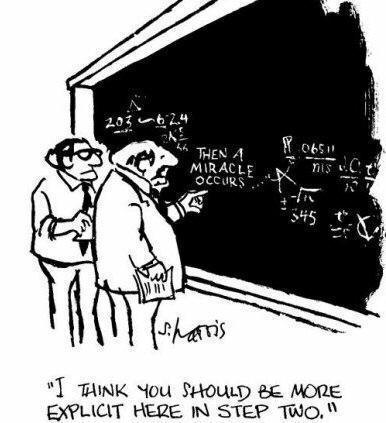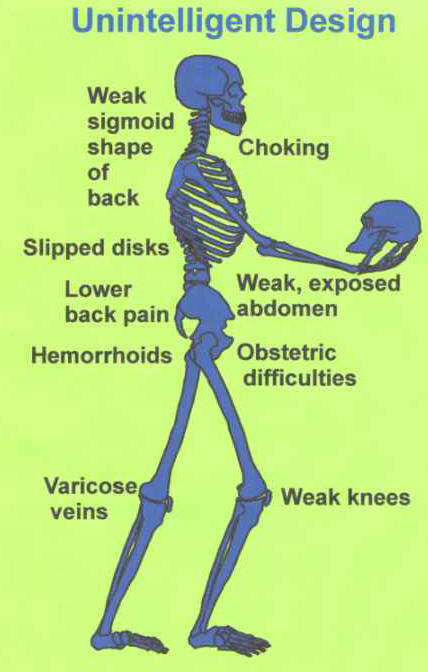|
Opinion- 26 Aug 2005 |
|
Is There a Parliamentarian Prepared to Stand Up for... Creationism? Intelligent Design? Science? |
William Jennings Bryan was a three-times defeated US presidential candidate. By 1925, Bryan and his followers had succeeded in getting legislation introduced in fifteen of the United States to ban the
 |
|
Credit: Sidney Harris, 1977 |
teaching of evolution. He was a fundamentalist Christian and made no bones about it.
Clarence Darrow a fixture in
In a recent News Feature "Who has designs on your students' minds?" Nature opens with, "The intelligent-design movement is a small but growing force on US university campuses. For some it bridges the gap between science and faith, for others it goes beyond the pale."
On August 1st the President of the United States, George W Bush, had an equivocating exchange with a Texas reporter:
Q: So [your] answer accepts the validity of intelligent design as an alternative to evolution?
THE PRESIDENT: I think that part of education is to expose people to different schools of thought, and I'm not suggesting -- you're asking me whether or not people ought to be exposed to different ideas, and the answer is yes.
Then on August 10th Australia's Minister for Education, Science and Training, Dr Brendan Nelson, told the National Press Club that he would oppose replacing evolution with Intelligent Design in Australia's science classes but said parents should be able to choose that their children learn about it:
Do I think it should be a replacement for teaching the origins of mankind in a scientific sense? I most certainly don't think that it should be at all. In fact, I'd be quite concerned if it were to replace it.
Do I think that parents and schools should have the opportunity — if they wish to — for students also to be exposed to this and to be taught about it? Yes I think that's fine. As far as I'm concerned, students can be taught and should be taught the basic science in terms of the evolution of man, but if schools also want to present students with intelligent design, I don't have any difficulty with that. It's about choice, reasonable choice.
There's nothing like having the courage of your convictions and stating them so that we, the great unwashed public, know where you stand -- but what effect might that have on one's onward and upward political movement? Mind you, Dr Nelson was not asked whether or not Intelligent Design should be taught as "hard science".
The Federal Minister for Health Tony Abbott was equally strong-hearted in replying to The Age when asked on his views regarding the teaching of Intelligent Design in schools:
This is a traditional argument which is put forward in theological classes but I'm not a theologian.
Not that the Federal Labor Party's Deputy Leader and spokeswoman for Education and Science, Jenny Macklin was less equivocal:
All young people should have an understanding of a range of religious beliefs.
With supporters like them, does science need enemies?
It's important to recall The Age reported that:
Bill Hodgson, head of Campus Crusade for Christ Australia, welcomed Dr Nelson's remarks as "fantastic", adding: "I think any reasonable and balanced approach to education has to take that view.
"This is not advocating the teaching of religion."
He said his group had never advocated the removal of the theory of evolution from school curriculums and said intelligent design was hard science, not creationism. "There is evidence of intelligent design. All we're saying is that the cutting edge of science is adhering increasingly to intelligent design."
 There is no
evidence for Intelligent Design, full stop. Intelligent Design declares that
elements of life are so complex that it is inconceivable that they came into
existence by means of the natural selection of chance alterations. And
inconceivable is equated to not possible. That is a declamation and there are no
data to support it. By it's very nature, it cannot be substantiated. Stated as
an article of faith... that's a different matter.
There is no
evidence for Intelligent Design, full stop. Intelligent Design declares that
elements of life are so complex that it is inconceivable that they came into
existence by means of the natural selection of chance alterations. And
inconceivable is equated to not possible. That is a declamation and there are no
data to support it. By it's very nature, it cannot be substantiated. Stated as
an article of faith... that's a different matter.
It has been pointed out by Creationists and those defending Intelligent Design that Neo-Darwinism is merely a theory. Theory, yes -- merely, no. Genetic mutation and environmental selection have been demonstrated in the laboratory time and time again. And it has been pointed out in a recent letter in Science by Laubichler, Müller, Fontana and Wagner, "[T]he evolutionary process rests on the dynamics of molecular and developmental interactions that collectively shape the outcomes of random mutation and selection in a nonrandom way. This weaving together of evolution and developmental processes provides the modern experimental and theoretical framework, grounded in Darwinian thinking, for explaining the organization of living systems."
The argument brought in defence of Intelligent Design is that it is all very well to demonstrate evolution for clearly identifiable stepwise changes but how can you possibly go, for example, from a light sensitive spot in a single-celled organism to a vertebrate or cephalopod eye via undirected mutation and mere environmental selection. Any honest evolutionist will reply, "I don't know, but I can outline various mechanisms how it could have occurred. It's true that currently we don't have a fossil record indicating how it occurred and we're not yet knowledgeable enough to set up conditions to demonstrate it in the laboratory, but that's very different from saying it required the existence of a supreme Intelligent Designer."
Those who invoke Intelligent Design are immediately blocked from further inquiry into the how of biological evolution just as much as those who state that the universe is a product of a Creator or Intelligent Designer are precluded from cosmological research. The cosmologist currently evokes the Big Bang of a "singularity" as the beginning of our universe, not as something incontrovertible but rather as a concept which, with our current state of knowledge, is compatible with what we know. Might that change with further observation and experimentation? Yes it might and indeed it probably will, and if it does, then the concept will be modified, just as Newtonian physics was refined with Einstein's discovery of relativity.
Intelligent Design inherently precludes scientific research. But neither Brendan Nelson nor Jenny Macklin were prepared to say so. Neither was prepared to say that part of the science syllabus should explain just what science is in contrast to beliefs which preclude constructive scientific curiosity.
The following points summarise the view of the Australian Academy of Science on the issue of Creationism. As yet the Academy has not published an opinion on Intelligent Design per se:
All scientific ideas are theories, imperfect and subject to test. That the theory of evolution is imperfect, and still the subject of study and modification, affirms that the theory is part of science. Many attempts to modify and expand the theory have been successful, showing (since Darwin's day) the gene-basis of inheritance, the basis of gene-reproduction in the double helix structure of DNA, the 'genetic drift' basis of the origin of breeds, and so on. Many challenges to the fundamentals of the theory have failed empirical test. The theory has attracted enormous empirical testing and remains one of the most powerful of scientific ideas.
The creationist account of the origin of life has been and remains an important idea in human culture. However it is not a scientific idea. That is, it is not open to empirical test. It is an article of religious faith.
The creationist account of the origin of life is not therefore appropriate to a course in the science of biology, and the claim that it is a viable scientific explanation of the diversity of life does not warrant support.
The Academy sees no objection to the teaching of creationism in schools as part of a course in dogmatic or comparative religion, or in some other non-scientific context. There are no grounds, however, for requiring that creationism be taught as part of a science course.
On August 31 ScienceNow published a short item under the title "Life Was No Mistake". It demonstrates the scientific approach to the question of how might life have begun. The method described doesn't give a definitive answer but it suggests a step in the path, and it is clearly in opposition to the declamatory approach of "It was the creation of an Intelligent Designer".
How did life evolve from nonlife? The jury's still out on that one, but scientists have now answered an equally important and related question: How did early RNA molecules grow longer and more complex without succumbing to destructive mutations? RNA, it turns out, can take a surprising amount of mutation and keep on ticking.
Scientists' best guess as to how life got kick-started in the primordial soup is that self-replicating RNA molecules acquired the ability to act like enzymes, using their shape to catalyze biochemical reactions essential for the growth of primitive cells. But therein lies a paradox: Larger genomes are required for higher complexity, yet the bigger the genome, the bigger the target for mutations that might turn it into gobbledygook. According to mathematical models, primitive RNA genomes, which lacked error-correcting enzymes, would have suffered a mutation overload long before they could have pulled off any tricks fancier than self-replication, let alone cell maintenance.
But these models have a weak link, according to a team led by Eörs Szathmáry, a mathematical biologist at the Institute for Advanced Study in Budapest, Hungary. The researchers focused on an assumption made by the models called the "error threshold," which predicts how big a genome can become before mutations warp its shape and render it useless.
To get a better handle on what the error threshold for early ribozymes might have been, the researchers turned to modern ribozymes. They pooled data on the effect of mutation on two simple ribozymes--one from yeast and another from viruses--that can cleave themselves in half. The team then tallied the effect of mutations on the ribozymes' shape and cleaving ability.
Ribozymes appear to be a whole lot tougher than was thought. Most single mutations did not affect the critical shape of the molecule, and multiple mutations tended to compensate for those that did. Based on their results, the researchers calculate that early ribozymes could have had as many as 100 simple genes, close to the minimum number thought to be required for primitive life. The team reports its results online this week in Nature Genetics.
This is "a landmark paper," says Günter von Kiedrowski, a biochemist at Ruhr University in Bochum, Germany. The next step, which von Kiedrowski calls "the big bang of biology," is to figure out how early self-replicating ribozymes came to be in the first place.
Alex Reisner
The Funneled Web